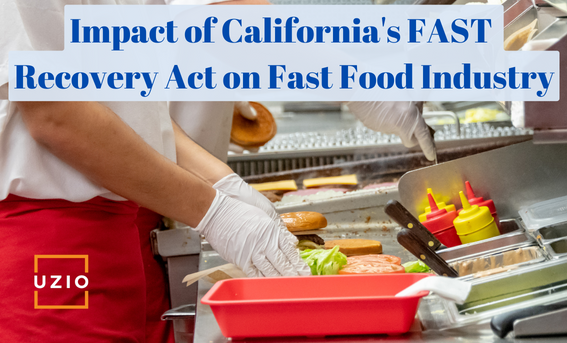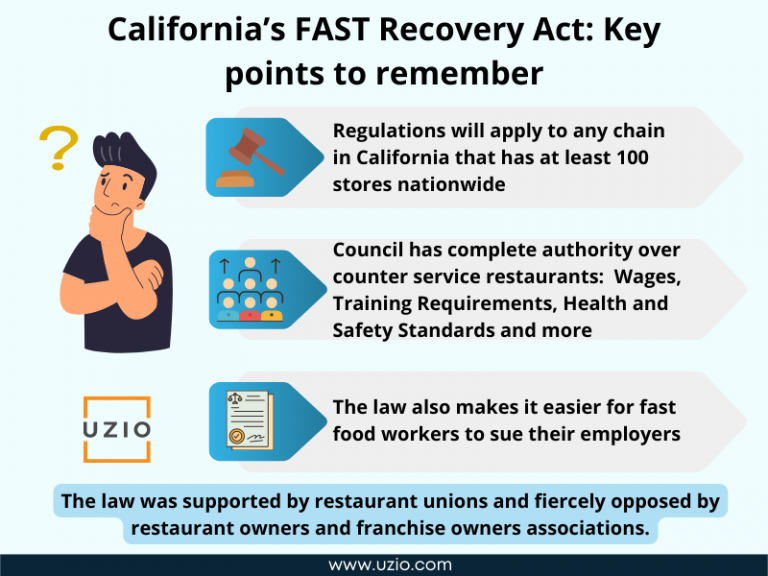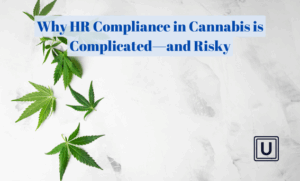
What is California’s FAST Recovery Act? How does it impact the Fast Food Industry?
Quick links
-
Introduction
-
Details of FAST Recovery Act
-
Impact on the fast food Industry
-
Impact on the fast food workers
-
What should you do as a fast food restaurant Owner?
-
What May Happen Next?
Introduction
On Labor Day, California Governor Gavin Newsom signed into law the FAST Recovery Act (or AB 257). The law is aimed at the fast food industry. The law aims to enact sector wide workplace rules and standards for wages, working hours and other working conditions related to the health, safety and welfare of fast food restaurant workers. The law would establish a Fast Food Council with vast amounts of powers to regulate the wages, working conditions etc for the fast food industry in California. The law was supported by restaurant unions and fiercely opposed by restaurant owners and franchise owners associations.
Details of FAST Recovery Act
The law is aimed at fast food restaurants which are part of a fast food chain consisting of 100 or more establishments nationally (think McDonalds, Burger King and the like).
The law would establish a 10 member Fast Food Council with the power to regulate wages and set minimum standards on working hours and other conditions for fast food workers. The council has vast powers which can not be reigned in even by the legislatures. For example, the council could increase wages for California’s estimated half-million fast food workers to as much as $22 an hour starting in 2023. Currently California’s minimum wage is $15 an hour.
The law also makes it easier for fast food workers to sue their employers. According to the law, an employer would be assumed to be discriminating against an employee (rebuttable presumption which is opposite of assumed innocent unless proven guilty) if the employer discharges or takes any adverse action against an employee within 90 days of that employee making a complaint about the employer with the authorities.
Impact on the fast food Industry
The impact on the Fast Food industry in California could be far reaching. The restaurants will almost certainly be forced to raise prices to the extent they can cover higher labor costs. Typically the fast food restaurants operate on thin margins so potentially some of them may close. The restaurants might also look to technology like self-order kiosks to replace the workers. According to the restaurant owners, this law may hurt the restaurant workers it is designed to help. Other businesses who compete with the restaurants for workers might also be forced to increase wages and pass that increased cost to their customers.
Impact on the fast food workers
The law was championed by fast food workers unions. The unions have heralded the law as one of the most significant pieces of labor legislation in a generation. According to the proponents of the law, the fast food sector has been rife with abuse, low pay, wage theft, unhealthy working conditions etc. According to them, the workers routinely face serious and unacceptable risks to their health and safety which this law is supposed to fix.
What should you do as a fast food restaurant Owner?
At the minimum, you should conduct an immediate review of your employment handbooks, training, working conditions, shift schedules etc to ensure you are in compliance with the current laws of California. You may want to engage with an employment law firm to perform a complete audit of your workplace.

What May Happen Next?
There will certainly be legal challenges to the law. There is also a push by industry advocates to start a referendum effort to put it in front of the California voters for the November 2024 ballot. It is hard to say whether any of these efforts will succeed so the employers should take steps outlined above to ensure they are in compliance with the law.





